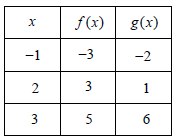HOW TO FIND THE MISSING VALUE IN COMPOSITION OF TWO FUNCTIONS
Find the value of k, such that f o g = g o f.
Example 1 :
f(x) = 3x + 2 and g(x) = 6x - k
Solution :
f o g = g o f
f[g(x)] = g[f(x)]
f[6x - k] = g[3x + 2]
3(6x - k) + 2 = 6(3x + 2) - k
18x - 3k + 2 = 18x + 12 - k
Subtract 18x from each side.
-3k + 2 = 12 - k
Add k to each side.
-2k + 2 = 12
Subtract 2 from each side.
-2k = 10
Divide each side by -2.
k = -5
Example 2 :
f(x) = 2x - k and g(x) = 4x + 5
Solution :
f o g = g o f
f[g(x)] = g[f(x)]
f[4x + 5] = g[2x - k]
2(4x + 5) - k = 4(2x - k) + 5
8x + 10 - k = 8x - 4k + 5
Subtract 18x from each side.
10 - k = -4k + 5
Add 4k to each side.
10 + 3k = 5
Subtract 10 from each side.
3k = -5
Divide each side by 3.
k = -5/3
Example 3 :
If f(x) = x2 - 3x - 1 and g(x) = 1 - x, what is the value of (f o g)(-2)
A) -3 B) -1 C) 1 D) 3
Solution :
f(x) = x2 - 3x - 1 and g(x) = 1 - x
(f o g)(-2) = f[g(-2)]
Finding g(-2) :
g(-2) = 1 - (-2)
= 1 + 2
= 3
Applying the value of g(-2)
f[g(-2)] = f(3)
Applying x = 3 in the function f(x), we get
f(x) = x2 - 3x - 1
f(3) = 32 - 3(3) - 1
= 9 - 9 - 1
(f o g)(-2) = -1
Example 4 :
If f(x) = (1 - 5x)/2 and g(x) = 2 - x, what is the value of f(g(3)) ?
A) -7 B) -2 C) 2 D) 3
Solution :
Given that f(x) = (1 - 5x)/2 and g(x) = 2 - x
To find the value of f(g(3)), first we have to find g(3).
g(3) = 2 - 3
= -1
f(g(3)) = f(-1)
f(x) = (1 - 5x)/2
f(-1) = (1 - 5(-1))/2
= (1 + 5)/2
= 6/2
= 3
f(g(3)) = 3
Example 5 :
If f = {(-4, 12)(-2, 4) (2, 0) (3, 3/2)} and g = { (-2, 5) (0, 1) (4, -7) (5, -9) }, what is the value of (g o f) (2)
A) -9 B) -7 C) 1 D) 5
Solution :
f = {(-4, 12)(-2, 4) (2, 0) (3, 3/2)} and g = { (-2, 5) (0, 1) (4, -7) (5, -9) }
(g o f) (2) = g[f(2)]
From the ordered pairs of f, we know that
f(2) = 0
Applying the value of f(2), we get
= g[0]
= 1
(g o f) (2) = 1
Example 6 :
The function f satisfies f(-1) = 8 and f(1) = -2. A function g(2) satisfies g(2) = 5 and g(-1) = 1, what is the value of f(g(-1))
A) -9 B) -7 C) 1 D) 5
Solution :
Given that f(-1) = 8, f(1) = -2, g(2) = 5, g(-1) = 1
f(g(-1)) = f(1)
= 2
So, the value of f(g(-1)) is 2
Example 7 :
g(x) = ax2 + 24
for the function g defined above, a is constant and g(4) = 8, what is the value of g(-4) ?
a) 8 b) 0 c) -1 d) -8
Solution :
g(x) = ax2 + 24 -----(1)
g(4) = a(4)2 + 24
8 = 16a + 24
8 - 24 = 16a
-16 = 16a
a = -1
Applying a = -1 in (1), we get
g(x) = -x2 + 24
g(-4) = -(-4)2 + 24
= -16 + 24
= 8
So, option a is correct.
Example 8 :
If f(x) = √x + 2 and g(x) = -(x - 1)2, which of the following is equivalent to g(f(a)) - 2f(a) ?
Solution :
f(x) = √x + 2 and g(x) = -(x - 1)2
g(f(a)) = g(√a + 2)
g(√a + 2) = -((√a + 2) - 1)2
= -(√a + 2 - 1)2
= -(√a + 1)2
= - (a + 2√a + 1)
= -a - 2√a - 1
2f(a) = 2(√a + 2)
= 2√a + 2
g(f(a)) - 2f(a) = - a - 2√a - 1 - (2√a + 2)
= -a - 2√a - 1 - 2√a - 2
= -a - 4√a - 3
Example 9 :
The table above gives values of f and g at selected values of x. What is the value of g(f(2)) ?

Solution :
Evaluating g(f(2)) :
From the table, for input x = 2
= g(3)
= 6
So, the value of g(f(2)) is 6.
Kindly mail your feedback to v4formath@gmail.com
We always appreciate your feedback.
©All rights reserved. onlinemath4all.com
Recent Articles
-
Digital SAT Math Problems and Solutions (Part - 150)
Apr 25, 25 11:46 AM
Digital SAT Math Problems and Solutions (Part - 150) -
AP Calculus AB Problems with Solutions (Part - 19)
Apr 24, 25 11:10 PM
AP Calculus AB Problems with Solutions (Part - 19) -
AP Calculus AB Problems with Solutions (Part - 18)
Apr 24, 25 11:06 PM
AP Calculus AB Problems with Solutions (Part - 18)
